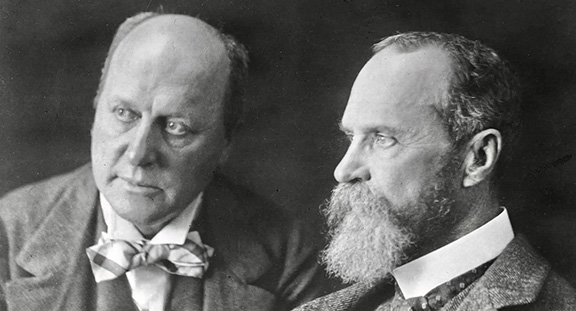Sibling Rivalry
Henry James accepts his brother William’s challenge.

The passage from William James quoted above is from “The Stream of Consciousness,” the eleventh chapter of his Psychology: Briefer Course. It’s nestled in a subsection headlined “‘Substantive’ and ‘Transitive’ States of Mind,” a fascinating consideration of how the conclusions we come to color our understanding of the movement of mind that carried us to them. Our substantive, or settled, states of mind, James explains, tend to overwrite the syntax of relations that gives our transitive states their motive force.
If there be such things as feelings at all, then so surely as relations between objects exist in rerum naturâ, so surely, and more surely, do feelings exist to which these relations are known. There is not a conjunction or a preposition, and hardly an adverbial phrase, syntactic form, or inflection of voice, in human speech, that does not express some shading or other of relation which we at some moment actually feel to exist between the larger objects of our thought. If we speak objectively, it is the real relations that appear revealed; if we speak subjectively, it is the stream of consciousness that matches each of them by an inward coloring of its own. In either case the relations are numberless, and no existing language is capable of doing justice to all their shades.
We ought to say a feeling of and, a feeling of if, a feeling of but, and a feeling of by, quite as readily as we say a feeling of blue or a feeling of cold. Yet we do not: so inveterate has our habit become of recognizing the existence of the substantive parts alone, that language almost refuses to lend itself to any other use. [Emphases as in the original text.]
“In either case the relations are numberless, and no existing language is capable of doing justice to all their shades”:it’s hard to read this sentence, and the two that follow, without inventing a scene in which William’s novelist brother Henry, puzzling over his elder sibling’s newly published work in London in 1892, takes a professional interest and exclaims, “Challenge accepted!”
In the years that follow, Henry will retire from London to Lamb House in Rye to conjure The Wings of the Dove, The Ambassadors, and The Golden Bowl, novels not only steeped in but aboutfeelings of and, and if, and but, and by, all the emotional relations that the words we speak can’t capture but stumble toward, over, under, around, before, after, into, against in the urgent uncertainty of our prepositional being. I picture Henry sending affectionately inscribed copies of his late masterpieces one after the other off to William in Cambridge, Massachusetts, playfully triumphant in the conviction that the recipient would never grasp how well his kid brother had succeeded in meeting the challenge the psychologist had inadvertently thrown down.
